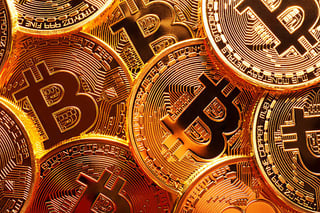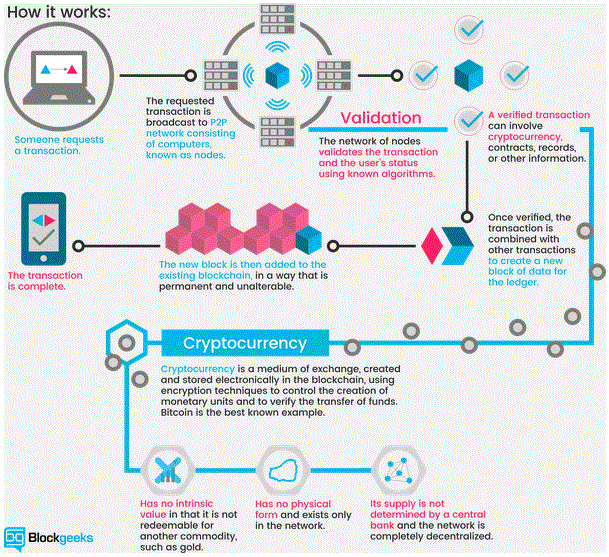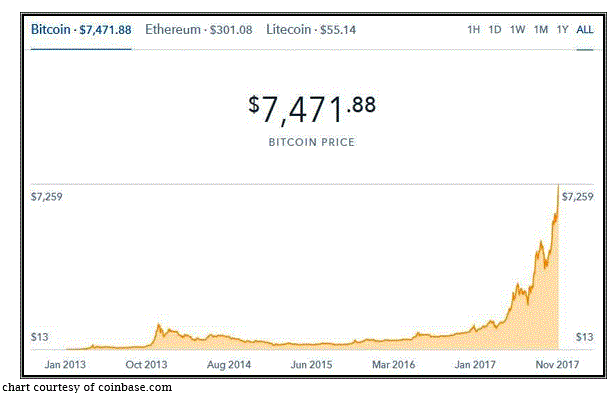November 8, 2017
Bitcoin and Block Chain - It Exists Everywhere and No Where
 Before we begin our discussion, we feel it imperative to define a few concepts. The first concept we would like to define is, "a medium of exchange." A medium of exchange can be ANYTHING that is WIDELY ACCEPTED in exchange for a good or service. The second concept is "currency." Currency is any form of money that is in public circulation, this can be hard money, like gold and silver or paper money or fiat, like the US dollar. What many know today as currency also comes with an "official" designation or decree, by some government agency, or in the US Dollar's case a private institution called the Federal Reserve. The US dollar is a fiat currency because it isn't back by anything other than by decree, which is where the term fiat comes from. Prior to 1971 the US Dollar was backed by gold and could be converted upon request.
Before we begin our discussion, we feel it imperative to define a few concepts. The first concept we would like to define is, "a medium of exchange." A medium of exchange can be ANYTHING that is WIDELY ACCEPTED in exchange for a good or service. The second concept is "currency." Currency is any form of money that is in public circulation, this can be hard money, like gold and silver or paper money or fiat, like the US dollar. What many know today as currency also comes with an "official" designation or decree, by some government agency, or in the US Dollar's case a private institution called the Federal Reserve. The US dollar is a fiat currency because it isn't back by anything other than by decree, which is where the term fiat comes from. Prior to 1971 the US Dollar was backed by gold and could be converted upon request.
From the distinctions we just made, we can than make the following logical statement: In the U.S. and most anywhere in the world, one can take their currency (US Dollar) and exchange it for any good and service. Now we say "any", for the sake of this argument, but it will become clearer to the reader later, that yes indeed the US dollar can be exchanged for anything legal or illegal, that is the reality, we aren't cynical here. This gives us a clean basis that defines our current state of currency and medium of exchange. We may get into the idea of store of wealth or a utility function, but for now let's stick with those two basics.
The United States is not alone in utilizing this fiat currency system, although it boasts the moniker "the worlds reserve currency”. It holds this title because we are the world's largest debtor and thus, we have flooded the world with dollars and its reciprocating shadow, debt. For in this type of monetary system, the US Dollar and debt are one and the same, one cannot exist without the other, a little-known fact to many, but truth none the less. Ok so the world has been using fiat currencies for around 1000 years now. The US Dollar has enjoyed reserve status for around 250 years and now comes along an innovation, a disrupter if you will, called blockchain.
Blockchain was a mathematical brainchild conceived in 2008 by an entity we only know as Satoshi Nakamoto. Most in the industry consider the name a cipher, but no clear owner has come forward, only speculation. What we think is truly interesting is the motive behind this invention.
The motive is clearly on display in the very first transaction or genesis block, which was embedded with this:
"The Times 03/Jan/2009 Chancellor on brink of second bailout for banks".[1]
Those familiar with my writing know how critical I am of any type of intervention in financial markets, being a follower of Austrian economics and a clear and utter disdain of anything Keynesian, you can see the excitement behind such a motivational beginning!
So, what is blockchain? Blockchain is a decentralized electronic ledger with duplicate copies (nodes) on thousands of computers around the world.[2] It's a contiguous "chain" of data "blocks". You will often hear of it referred to as a distributed ledger that records transactions between two parties. Obviously, we are just touching upon broad strokes, we aren't getting into the mathematics behind it, we aren't getting into the cryptography either, but we will touch upon it being open source. Open source simply means a collaborative and universal access as opposed to a license and fee based software model. Another term we need to touch upon is DECENTRALIZATION.
I think out of all the characteristics, this is the largest disruptor, especially for governments. Decentralization is the basis for the title or our letter today and rightfully so, therefore we say it exists everywhere and nowhere. We can utilize blockchain in a way that allows us to embed "trust" based upon a mathematical validation process, by which we no longer need intermediaries to provide that data. The protocol by means of validating all the transactions, then disseminating and openly broadcasting the transactions and then adding it to the blockchain, provides the "trust" that the data file is clean. This is revolutionary, and its possibilities are endless, its utility function is endless.
In fact, here is what Christian Catalini an MIT professor, expert in blockchain technologies and crypto currency recently said when asked what industries will this technology disrupt? "ALL OF THEM"[3]
So, let's review the main points about blockchain:
- Digital Distributed Ledger
- Utilizes mathematics and cryptography
- Open Source
- Decentralized
Once again it is important for you the reader to understand that this explanation just covers the very broad strokes, please do your own due diligence and follow up this reading with further research and discovery to this subject.
Ok For a visual as to tie this all together here is a great flow chart:

Now that we have the basics of blockchain down, let's move to Bitcoin. What is Bitcoin?
Bitcoin is Cryptocurrency, or a form of digital payment system based on a peer to peer network.
What is meant by peer to peer is that the transaction takes place between party A and party B without the intervention of an intermediary. We suppose the word "direct" makes sense here. So, from the chart above, you can see where Bitcoin comes into play. At the point of validation, "miners" those utilizing computing power, mathematics and energy to solve the complex mathematical computations, which are required to validate the transactions and adding them to the blockchain are rewarded with Bitcoin. This is how Bitcoin come into existence. They aren't created out of thin air (think quantitative easing by central banks), they are created by the employment of energy generated by the miners in order to provide the validating service and adding transactions to the block chain. This is the incentive for building the chain. I believe these miners provide the most essential function in that as in the original white paper by Nakamoto described is that, an electronic payment system must be based on cryptographic proof instead of trust.[4] By having this digital history of transactions locked into a data chain that is immutable is the real utility function. This validation solves the double spend problem, by validating current transaction which comes with all the data history hard coded. Basically, the validation can only occur if all the data is clean and unaltered. One way to look at double spending is that party A cannot send to party B something it doesn't have. Another fantastic attribute of Bitcoin is that there is a critical limit or supply limit to the amount of bitcoin that can ever come into existence. The mathematics embedded into Bitcoin allow for a set amount of Bitcoin overtime with the supply to never exceed 21 million. This supply acts as a constraint, but it also means that demand will ultimately drive the price and unlike fiat currencies, artificial devaluation is not possible.
A recent Fed Primer paper talked about Bitcoin's "decentralized nature as both its most ambitious feature and its main vulnerability".[5]
This is a vulnerability because the validation process takes time, maybe ten minutes or more. I don't agree with this proposition that it’s a vulnerability, because I don't think we can think of the technology in terms of speed. Rather, I would look at it as sacrificing time, for accuracy and validity. All too often I believe this fast-paced high frequency world forgets that quality sometimes takes time and not everything of value relies on speed.
So how can a consumer or non-miner acquire or obtain Bitcoin and why even bother?
Bitcoin can be bought locally from local supplier’s face to face. Bitcoin can be acquired through a Bitcoin ATM if available. One can sign up to purchase Bitcoin on one of the various exchanges like Poloniex or Coinbase. Both follow strict AML laws and require complete ID and other various validations for before you can enter their exchange and purchase Bitcoin. These exchanges allow you to store your Bitcoin and other crypto currencies directly in one of their in house wallets. You can also purchase your own digital wallet and put your Bitcoin's there and take them offline or what is known as cold storage.
So why own them?
The first answer lies within a bet on the future of monetary transactions. With governments indebting themselves exponentially, one can see that the only way out is through inflation or its flipside, devaluation. Bitcoin can be considered digital gold. Its supply is limited, and it cannot be devalued by stripping it down or adding more supply.
By utilizing the blockchain for peer to peer payments, Bitcoin eliminates the need for intermediaries such as banks. These intermediaries add an extra layer of costs (fees) to every transaction and it acts as a constraint to our current fiat monetary system
Its seamless, frictionless and can be decimalized, meaning one does not have to purchase an entire Bitcoin, it can buy .001 or even less if necessary.
Blockchain and Bitcoin are new innovations and the prospect of widespread disruption and adoption is far greater than what the masses currently are aware of. I like to think of it as a call option on the technology itself, perhaps view it as the internet in the early nineties.
Bitcoin exists as an open source distributed, decentralized and anonymous electronic ledger.
Society is moving toward digitalization in every aspect of life, the advance of Cryptocurrency as a medium of exchange is a part of that revolution.
Bitcoin unlike US Dollars have intrinsic value. They are created via the utilization of computational power, energy and time and this creates a valid, trusted, open system that benefits everyone, without exception. The fiat currency system exists as a construct of debt, which requires interest and inflation to maintain value, this system is archaic and its utility in a digital age as a medium of exchange is subpar. Just to be clear, I think there is a definite use for compound interest and debt, but not as a medium of exchange.
Bitcoin is convertible to any other currency crypto or fiat, or hard money. My viewpoint takes a more passive longer-term approach to the technology and suggests that the owners of Bitcoin will hold rather than sell their stake in the system. This constraint if you will, should figure into reducing, dramatically the available supply of Bitcoin outstanding, which should put upward pressure on its valuation.
So, let's review Bitcoin:
It's a Cryptocurrency
- It's a direct peer to peer payment system
- They are "mined" into existence
- Their supply is capped at 21 million
- They can be exchanged for other currencies, goods or service
- The technology is in its infancy and its real purpose may not yet be known
Furthermore, the price of Bitcoin has shown great resiliency and sits on all time highs:

Furthermore, some of you may ask why would someone pay $7400 for one Bitcoin? This is a question we have received every time it reaches new highs, $100, $1000, $5000. I don't think the question is valid, instead I would rather people stop valuing Bitcoin in terms of converting to US dollars or any other currency, but rather as a long-term investment on the future of a technology whose true applications may not yet be known. I don't think valuing vs the US Dollar makes much sense, in fact the construct of time is a deterministic factor for valuing any fiat currency, basically time eventually makes the US Dollar worthless. Whereas, I feel the Bitcoin price is directly proportional to the value of all global transactions, for me that single fact is scary and exciting in of itself.
When you start to contemplate the future and the way it's being shaped, the more you realize all we have known, the way economics has existed, the way labor has been compensated for, is about to change like never before. Consider also the fact that in US dollar terms, global GDP sits at $72 Trillion. At $7000 Bitcoin's market cap is around $114 Billion, you tell me where the real value is. If Bitcoin can capture just 1/2 of 1% of global GDP that would mean Bitcoin would be worth $23,000 each. Will leave the valuation up to time, only time will provide us with an accurate assessment as to the worth of Blockchain and Bitcoin.
What is the downside and what are the expectations?
It’s been quite clear throughout time as each innovation takes shape, that with it comes volatility and a weeding out if you will. The adoption of Blockchain like any other new technology always comes with a bit of trepidation and skepticism. The focus upon Blockchain and Bitcoin early on was its use in funding illicit purchases on websites like Silkroad. There was also an emphasis placed on the vulnerabilities at the exchange level. Mt. Gox one of the first exchanges based out of Japan ended up filing for bankruptcy. At one-point Mt. Gox handled most of all Bitcoin transactions, but mismanagement and unconfirmed factors led to its demise. This led to volatility in its price, led to many investors losing everything and many to question the validity of the technology. However, we would note that time and time again, the price has rebounded. I’d like to think that the main stream and federal level viewpoints seem to stress the illicit uses of the technology, but deny the fact that the US dollar is the true kingpin when it comes to those activities. In fact, bitcoin is a constantly updated never to be tampered digital ledger, meaning all transactions are traceable to the beginning of existence, the same cannot be said for cash transactions. So, I don’t see any validity in this claim that Bitcoin is the widespread defacto utility of choice by illicit contraband carrying cartels. Governments should be less focused upon controlling or regulating Bitcoin and more focused upon adopting the technology. There is no doubt that one of the downsides is this adjustment period during the technologies early adoption, but we feel weeding out bad actors and maintaining integrity is key to validating the technology and will propel its growth far into the future. I don’t know what to really expect from Bitcoin or Blockchain other than the fact that the prospects of its widespread game changing effect on every industry is truly astonishing.
Finally, I am excited about the technology and where it will eventually take us. I think mankind has been hindered somewhat by the profit motive incentive, by the lack of trust between counterparties and this technology has the capability of changing all of that. I know that many industries are embarking on this blockchain technology and that its adoption will continue to grow. I understand the threatening nature of a decentralized, open source protocol and governments will try to adopt regulation, assert authority and even come up with their own Cryptocurrencies. I also know their private key blockchain technologies will not be immutable, will not be unhackable because of their private key nature, so it will not be the same. I mean would you trust Chasecoin or Experiancoin, considering their reputation for security and integrity, it’s a matter of open source protocol and distribution vs privately managed domains. We know many industries will be transformed, many will perish, but new ones will spring up. No matter what, this technology has the capacity to revolutionize the way we do everything, the way we look at everything and the way we view and shape the world to come.
[1] Davis, Joshua (10 October 2011). "The Crypto-Currency: Bitcoin and its mysterious inventor". The New Yorker. Archived from the original on 1 November 2014. Retrieved 31 October 2014
[2] Armstrong, Stephen (2016-11-07). "Move over Bitcoin, the blockchain is only just getting started". Wired. Retrieved 2016-11-09.
[3] Church, Zach (2017-05-25). “BLOCKCHAIN, EXPLAINED”. MIT Management Sloan School. Retrieved 2017-11-04.
[4] Nakamoto, Satoshi (October 2008). "Bitcoin: A Peer-to-Peer Electronic Cash System" (PDF). bitcoin.org. Archived (PDF) from the original on 20 March 2014. Retrieved 28 April 2014
[5] Velde, Francois R. (11/4/2013). "Bitcoin: A Primer" Chicago Fed Letter, No. 317, December 2013
